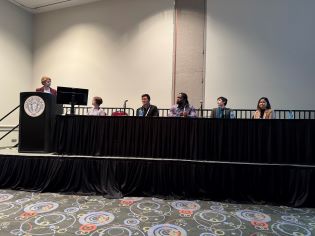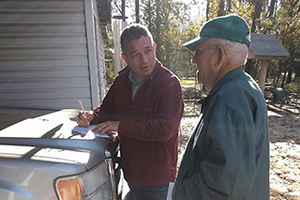Science Leadership
Several SRP grant recipients and trainees presented oral presentations at the Society of Toxicology (SOT) annual meeting.

Symposium panelists and Carlin (second from left) discuss PFAS.
SRP Health Scientist Administrator Danielle Carlin, Ph.D., was on the planning committee for the “New Investigator and Funding Insights” session at the SOT annual meeting. This session provided multiple perspectives on the NIH grant process, as well as advice for new applicants.
Carlin also co-chaired two symposiums at SOT. The first symposium covered how PFAS are associated with metabolic disturbances and chronic disease development. The second symposium reviewed the state of science linking environmental chemicals to age-related neurodegenerative diseases. Carlin and three SRP grant recipients presented at the second symposium: Allison Kupsco, Ph.D., Columbia University; Quan Lu, Ph.D., Harvard University; and Lisa Truong, Ph.D., Oregon State University.

George collects information from a North Carolina property owner about his well water. (Photo courtesy of Andrew George)
Andrew George, Ph.D., community engagement coordinator at the University of North Carolina at Chapel Hill SRP Center, was interviewed for an NIEHS Grantee Highlight about his work with communities affected by contamination in well water. George also explained the center’s participatory approach to research.
Kathleen Vandiver, Ph.D., leader of the Massachusetts Institute of Technology SRP Center Community Engagement Core, was featured in an NIEHS Grantee Highlight. Vandiver discussed her work with the Passamaquoddy Tribe and her dedication to educating the next generation of scientists.
Jane Hoppin, Sc.D., a project leader at the North Carolina State University SRP Center, spoke about her work leading the GenX Exposure Study in an NIEHS podcast. Hoppin explained how the study was launched in response to concerns of Wilmington, North Carolina, residents about PFAS in their drinking water.
to Top



